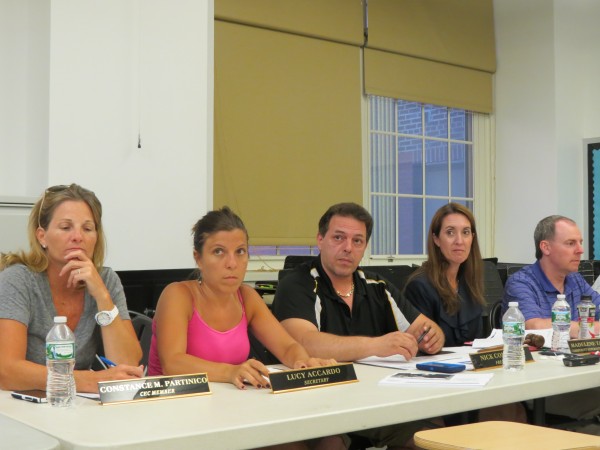
Like many other councils throughout Queens, Community Education Council 24 remains a harsh critic of the Common Core educational policies in city schools. File Photo
Despite the fact that city students showed some progress in the second round of standardized test scores, based upon the re-made and highly controversial Common Core standards, many members of the community, from parents and educators to politicians, said they remained skeptical about the more rigid Common Core curriculum and standards.
First implemented in New York State in 2011 with the initial round of testing just last year, Common Core has made more than its share of enemies.
Although the arguments against Common Core vary, there were numerous across-the-board complaints.
Key among those complaints argued that the curriculum and standards put too much emphasis on test scores while also being introduced much too quickly, without adequate input from educators and parents.
Critis also said that Common Core was not researched well enough, and in many cases, is developmentally inappropriate for certain age students.
Others have derided the Common Core curriculum as education that is guided at the federal, instead of the state and local levels, as a result of 2009’s American Recovery and Reinvestment Act, which included $4.35 billion in President Barack Obama’s federal Race to the Top initiative.
The initiative stipulated that states that agreed to implement higher educational standards geared towards college and career prep could receive a portion of the money. Also included in the initiative were annual, professional performance reviews for teachers and principals.
Peter Vercessi, a member of Community Education Council 24 of central Queens, said that Common Core needs work. Vercessi called the curriculum’s goals unrealistic and also said that many teachers are “frustrated” on a daily basis.
“The curriculum was rolled out too quickly with not enough input from teachers as well as parents,” he said.
Asked about the latest round of test scores, where some city students improved, Vercessi said he was skeptical.
“I’m always very leery of scores. The state can always manipulate data and raw scores to give different impressions of student achievement,” Vercessi said.
He also added that a true indicator of how Common Core was working would be to wait another year and ask all involved parties–teachers, students, and parents if they feel more comfortable.
Some students have also not hesitated to let their feelings about Common Core be known.
Ekraa Kazii, a student at I.S. 141 in western Queens, wrote recently on her Facebook page that, “This common core program is over-complicating everything, in 7th grade, we do college level problems.”
She added, “Scale factor is not for 7th grade.”
A spokesperson for the Northeast Queens Tea Party Patriots also didn’t mince words regarding Common Core.
“Few K-12 teachers were involved in writing the Common Core standards, which actually lowers standards, and it standardizes the curriculum with a uniform one-size-fits all solution that has caused teachers, parents and students to protest its implementation,” said the spokesperson.
Further, calling Common Core a “teach to the test” curriculum, the patriots said that it penalizes high achievers who must settle for lower standards of a relatively dumbed-down uniform curriculum.
As the Republican candidate for governor of New York, Rob Astorino said his dislike of Common Core went even further when he announced his “Stop Common Core Ballot Line.” Astorino, in stark contrast to current Gov. Andrew Cuomo – a staunch advocate of Common Core – said this past July that he would scrap Common Core altogether, if elected.
Although some states have repealed the national Common Core curriculum, political insiders said it is unlikely the same would happen in New York, given Cuomo’s continued strong support as well as state Regents’ Chancellor Merryl Tisch. Tisch has repeatedly defended Common Core and most recently announced that the curriculum’s phase-in would be slowed down in New York.
Some people still said they remained unconvinced.
Kevin Ryan, president of the Northeast Republican Club, acknowledged the need for high standards in schools, but he, like many others, said that the current implementation of Common Core was forced on teachers, administrators and students without proper input and discussion.
“It seems that every parent I talk to is greatly stressed because their children are not learning and enjoying school like they should,” he said.
Ryan also favored scrapping Common Core with an eye towards developing new standards with more input from educators and parents throughout the state.
Meanwhile, at Scholar’s Academy in Rockaway Park, which found itself among the city’s top 10 in reading proficiency during the recent second round of tests, the Common Core didn’t seem quite so daunting.
“The Scholars’ Academy’s improved scores are the result of ample teacher teamwork and adult learning,” said Principal Brian O’Connell.
He said that over the past several years, teachers have benefited from several city Department of Education curriculum and assessment redesign initiatives with the common core learning standards serving as key to their work.
“In my opinion, all schools have an opportunity to improve their results as they mobilize teachers to refine the designs of units, lesson plans, and assessments during the weekly teacher learning time established by the chancellor’s office and UFT in the recently negotiated teachers’ contract,” the principal said.
Speaking specifically about standards, O’Connell said that “there isn’t, nor will there ever be, a ‘holy grail’ set of learning standards that are beyond receiving the benefits of professional educator-practitioner feedback.”
Asked about the possibility of Common Core being radically changed, O’Connell also said that was neither likely nor advisable.
“Scrapping the standards and starting anew may prove to be an over-reaction to implementation issues. Such a drastic reaction would likely waste funds on yet ‘newer’ books, materials, retraining, tests, etc.”
O’Connell also noted that teachers, students, parents, and administrators could likely agree that they would benefit from consistency and stability.
“Change can be a good thing, but too much–too fast–too frequent is chaotic and stressful.”
By Alan Krawitz
